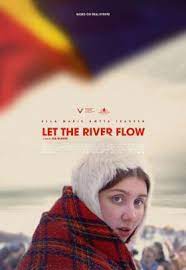
LET OF THE RIVER FLOW/ ELLOS EATNU - LA ELVA LEVE
Norway, 2023, 120 minutes, Colour.
Ella Marie Haetta Isaksen, Gard Elvenes, Ivar Beddari.
Directed by Ole Glaever.
A review for this film within Norway would be quite different from a review for audiences outside the country. It does a deal with historical events, issues of rivers and dams in the late 1970s and early 1980s, government decisions about hydroelectric power and the damming of rivers (similar issues in Australia, Tasmania, in the early 1980s with the damming of the Franklin River – dramatised in the documentary film, The Giants). There are the protesters, urging non-violence, delaying government legislation, demonstrations and large numbers of police coming into disperse the demonstrators. 21st-century audiences will be more sympathetic to the protesters.
However, many Norwegians, especially the Sami people of northern Norway, will see it as a film about their cultural identity, their own language, their history, colonial attitudes by mainstream Norwegians. Reading commentaries by Sami audiences highlight how important this film is for them, even in the 21st-century, to highlight their history, their traditions, hunting and fishing, culturally and historically different from the Scandinavians. (It is worth googling Sami for explanations and background, and discovering that the Sami people prefer not to be called Laplanders.)
At the centre of the film is a young woman, Ester, Sami, trained as a teacher, her father dead, her mother marrying again, but a Norwegian with strong views, and now a half-brother who has been brought up as Norwegian rather than Sami. The young woman is Ester (Ella Maria Haetta Isaksen in her only screen role to date). She seems to have somewhat of a morose disposition, clashing with her mother, helped by her stepfather but her seeming resentful, encountering her Sami cousin who appears in traditional dress and headdress. He is heavily involved in the protests, taking Ester to the camp, her meeting the leaders, but her going to school, concealing her identity, listening to some of the taunts of the staff.
The dramatic development, in no way hurried during the two-hour length of the film, shows Esther gradually becoming more involved with the cause, understanding it, joining the protesters, appearing on television, becoming far more active, making stances like giving a Sami headdress to her half brother for Christmas to her parents’ dismay, discussions with the protest leaders, wanting to organise locals to join with the protesters on the roads, 600 police being shipped in.
Ester is a difficult personality to warm to, some admiration for the changes, but she barely smiles let alone laughs, always serious, but becoming more serious as she becomes involved in her cause.
So, a challenging film for Norwegian audiences, affirmation for Sami audiences, and a different cultural experience for non--Norwegian audiences.
1. A Norwegian film, the focus on the Sami people, identity, language, oppression?
2. The response of a Norwegian audience? Attitude towards the Sami people? Their language? Use of the Sami language, racial prejudice against the Sami? The long traditions? Dramatised in 1979-1981 here?
3. The locations, the north of Norway, the name of Lapland, the name of the Sami? Forests, lakes, rivers, homes, the range of the seasons and scenery? The school and interiors? Homes? Musical score?
4. Audiences outside Norway and the focus on the environmental issues? The dam, the lake, the river, hunting and livelihood? Issues of progress, electricity and dams? The protests and the causes? Politics, political decisions? Protests and the police, treatment?
5. Norwegian audiences, memories of the Alta river and protests? The Norwegian characters in the film, the family, politicians, pro the dam? The Sami people, protesting against the dam?
6. The focus on Ester, her background, the death of her father, her mother remarrying, a Norwegian, her half-brother, sense of alienation, the clashes with her mother during visits, the training as a teacher, going to the school, meeting with the children, their reactions? The boy who didn’t speak? Her concealing her Sami identity? The effect on her?
7. The issue of the dam, hydroelectric power, the 1970s and 80s, around the world? The Norwegian issue? The protesters, their cause, anti-violence, demonstrations, meetings, road blocking, the reaction of the police, dragging protesters away?
8. The issue of the identity, Ester concealing hers, the meeting with Mihkkal, cousin, his clothes, driving her, meeting the protesters, at school, the staff, their political stances, her reticence?
9. The film as the transformation of Ester, with Mihkkal, with the protesters, her convictions, her identity, gradually revealing it, demonstrations, on television, the consequences for her? Change, confronting her family, the Sami headdress for her half-brother, her mother’s reaction? Her stepfather her stepfather and his strong Norwegian stances? Yet kind to her? The interactions with Mihkkal, with the protesters, at school? Her organising the meeting at the church, few turning up, antagonism? Signing up Mihkkal? Going to see him, his depression, his suicide, the sadness of the funeral?
10. The buildup to the final protest, the 600 police, the night confrontation, the protesters in the Sami clothes, as to herself, dragged away?
11. At school, the reaction of the staff, Goran and his attitudes towards Ester? The young boy, going to his house, his mother, leaving Ester alone, the music?